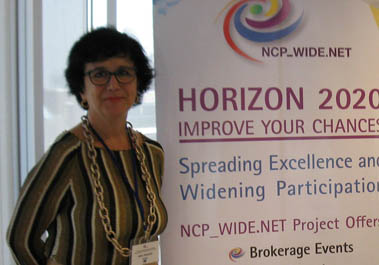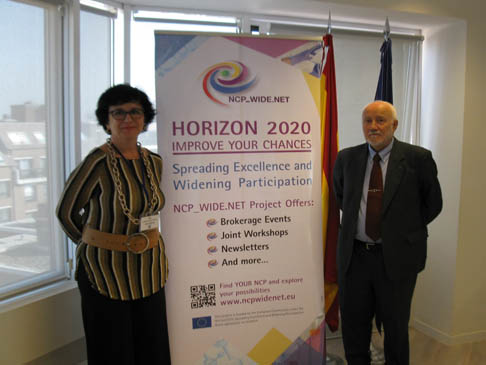
INTERVIEW WITH ANA HIDALGO
Doctor of Chemical Sciences and MSc in Translation and Interculturality –with Extraordinary Prize–, she has worked in several centres of the CSIC in the area of Materials Science, on which she has published more than 65 articles. Since 2008, she is Head of the Office of International Programmes of the CSIC Office in Andalusia, and since 2014 she is National Contact Point (NCP) of the programme “Spreading Excellence and Widening Participation” of H2020. She is also an independent evaluator of ERASMUS+
What is the reason for your visit?
I am the principal organiser of the workshop “Synergies between ESI Funds and Horizon 2020 understanding how theSynergies work in practice”.
Is this something occasional or do you come to Brussels often?
Since I am a National Contact Point of “Spreading Excellence and Widening Participation” I come here more frequently to participate in Infodays of the Commission or in different workshops organised within the framework of the transnational network of national contact points of this programme (project NCP_WIDE.NET).
Could you briefly summarise the purpose of the NET_WIDE.NET project, funded by H2020?
The main purpose of the NCP_WIDE.NET project is to create a transnational network of National Contact Points (NCPs) for “Spreading Excellence and Widening participation” in Horizon 2020 with the aim of facilitating transnational cooperation among NCPs and to identify, share and raise the general support levels for those who apply for this programme.
In your opinion, how does the CSIC benefit from participating in this type of network?
Obviously, having national contact points among its staff provides a series of advantages to the CSIC.
The specific National Contact Points of each programme access this type of network, like that of NCP_WIDE.NET; in fact, there are several thematic networks, such as RICH 2020 “The Research Infrastructures Consortium of NCPs for H2020”, Health NCP Net 2.0 (Societal Challenge 1: Health, Demographic Change and Wellbeing), etc., and ours: NCP_WIDE.NET (Spreading Excellence and Widening Participation).
NCPs are the professionals in charge of offering advice and information to all those interested in European projects of research and innovation, whether they are companies, universities, technological centres or public research organisations. Furthermore, they spread information about funding opportunities, specific training about preparation of proposals, project management and proposal revision.
To carry out the tasks mentioned, good training is required, not only specific to the programme we manage, but training that covers the entire H2020. This training, which we receive from the Ministry, is also very useful when it comes to performing the functions of someone like me, who has the same duties at the level of the CSIC in Andalusia.
On the other hand, we get first-hand information from the Commission, we expand our contacts in Brussels and, through the transnational network of national contact points, we improve the quality of our skills, exchange information about opportunities and important aspects of H2020, assist in the search for partners, etc. And all this has a positive effect on how I perform my job, which is an advantage for the CSIC.
Regarding the subject of the seminar, do you know any project of the CSIC in which structural funds had been combined with those of H2020?
The synergies between structural funds and those of framework programmes is not a new thing; there are many cases at the project level. In fact, it is a common practice that the results obtained from a competitive funded programme, such as framework programmes, are capitalised or priced with a project of territorial cooperation (structural funds) like INTERREG, and also with projects of national/regional funding or with private funding. Likewise, there were cases in which the purchase of equipment was defrayed by structural and framework programme funds, in a complementary way. Therefore, some studies have been carried out under the coverage of regional, national and European projects, and with private funding.
For the sake of mentioning some examples, the European projects EDEN (FP6), EDENEXT (FP7) and Eurowestnile (FP7), whose PIs are Ramón Soriguer and Jordi Figuerola, researchers of the Doñana Biological Station, had synergies with projects of the Regional Government of Andalusia (whose funds are partly from structural funds) and the National Plan.
Likewise, with ECOGENES, a REGPOT of 4.7 million euros, also granted to the Doñana Biological Station, a lot of equipment was purchased which was later used for other European projects (among which were EDENEXT and Eurowestnile), and also projects funded by private companies (National Federation of French Hunters), foundations (Volksvagen Foundation) and national and regional projects.
Another example is that of the Institute of Materials Science of Seville, which was also granted a REGPOT of 3.6 million euros, the AL-NANOFUNC project, designed for installing and developing an advances laboratory for Nano-analysis of new functional materials. The PI in charge, Asunción Fernández Camacho, managed the purchase of a transmission electron microscope with the REGPOT funds and, in a complementary way, a series of accessories, through infrastructure programmes of the Regional Government of Andalusia and its structural funds. The acquisition was performed consecutively and, on the other hand, the research, which was not funded by a REGPOT, could be funded with the projects of excellence of the Regional Government of Andalusia, also with structural funds.
Currently, the CSIC also participates in more than one proposal of teaming actions; one of them is for the creation of a centre of excellence in functional glass. The goal of the Centre of Excellence planned is one of the RIS3 priorities of the country (Slovakia). In order to meet the selection criteria of H2020, the applying institution must write a letter to the national or regional authorities about their commitment to provide financial resources (for instance, resources from Structural or Investment Funds), for the creation of the future centre, particularly regarding the investment in infrastructure and equipment.
How did you find the seminar? What are your main conclusions?
The seminar was very interesting and it had a very good appreciation among the attendants. We received a very positive feedback, which encourages us to keep working on further improving the quality of our activities.
As a general conclusion from this seminar, I must say that in the current process of development of synergies, we must all consider three levels of action: strategy, programme and project. The strategy and programme levels are fundamental to ensure policy continuity, long-term perspective and the effective application of strategy. Likewise, strategic cooperation between public authorities in charge of the design of programmes is essential, e.g. directing the investments in research and innovation towards the priority areas identified in the smart specialisation strategies (RIS3), which support competitiveness and development.

Ana Hidalgo with Rafael Rodríguez, Research Professor of the CSIC, presenter of the seminar, who was a delegate of the CSIC at the Office in Brussels (1997-2003), institutional coordinator of the CSIC in Andalusia (2003-2007), he currently works at the Institute of Environmental Diagnosis and Water Studies, with the main goal (entrusted by the President of the CSIC) of “supporting the participation of the CSIC in the execution of regional Operational Programmes which, with variable efficacy, aim to develop RIS3, which is a strict conditionality for the use of structural funds to promote regional research and innovation, which are priority issues. In other words, the cooperation between Industry and the Academic sector to identify and support the development of specialisation niches within the regional economies”.
